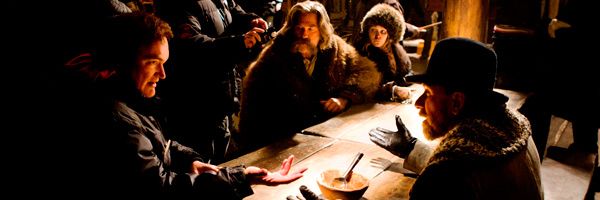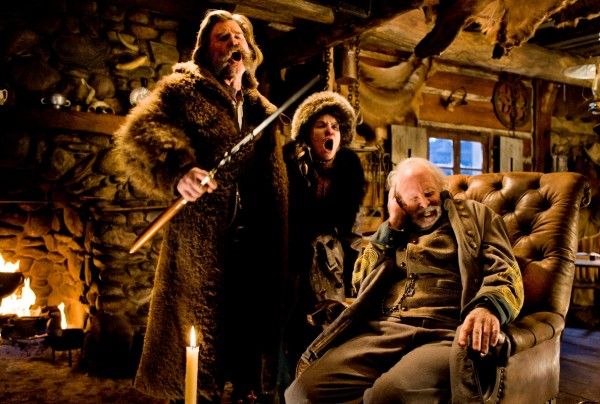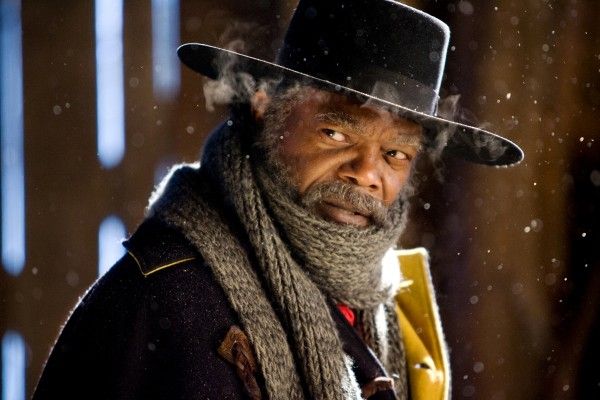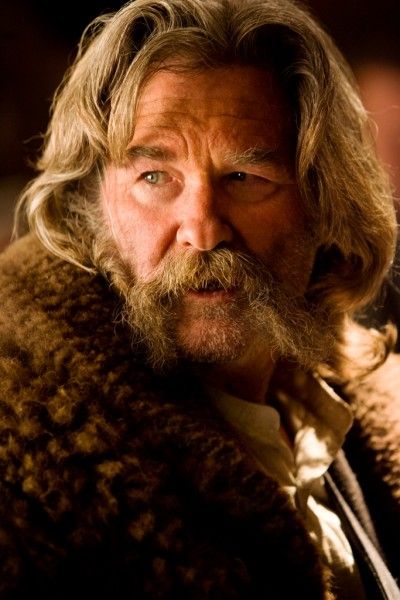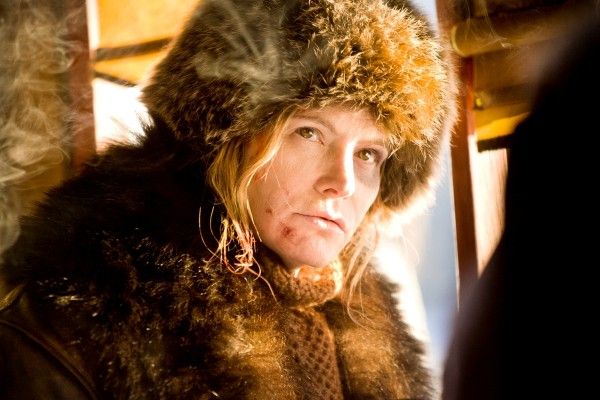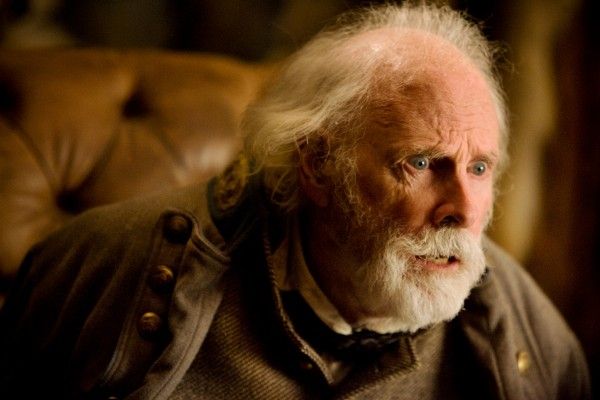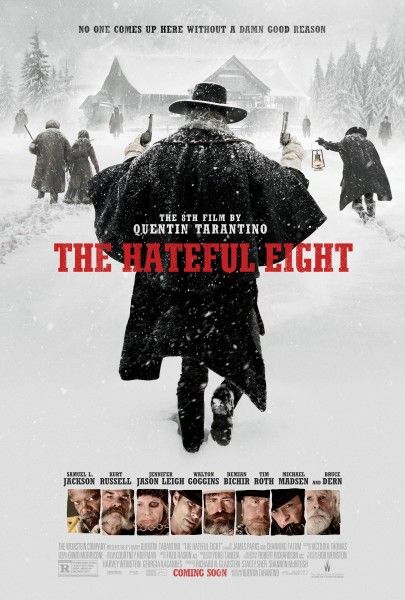From filmmaker Quentin Tarantino, The Hateful Eight finds bounty hunter John Ruth (Kurt Russell) on his way to taking fugitive Daisy Domergue (Jennifer Jason Leigh) to justice in Red Rock. Along the way, he picks up Major Marquis Warren (Samuel L. Jackson), a black former union soldier turned bounty hunter, and Chris Mannix (Walton Goggins), a southern renegade who claims to be the town’s new Sheriff, and the group stop off at Minnie’s Haberdashery to seek refuge from an oncoming blizzard. When they arrive, Minnie is nowhere to be found, as they are greeted by a caretaker named Bob (Demian Bichir), hangman Oswaldo Mobray (Tim Roth), cow-puncher Joe Gage (Michael Madsen) and Confederate General Sanford Smithers (Bruce Dern), and they all quickly realize that the blizzard may be the least of their problems.
During a conference at the film’s press day, Quentin Tarantino spoke about his decision to screen the film in 70mm, the intimacy that provided the actors, why he’s so interested in past historical periods and cinematic styles, whether he’d ever explore a story that’s set in a future world, the ability to explore present themes in the Western genre, how he feels about the threat that the police union issued toward him, and his thoughts on being politically correct in today’s society.
Question: Using 70mm is epic in scale, in terms of using the frame, but what does it give your actors, in terms of intimacy?
QUENTIN TARANTINO: One of the tricks that I had thought about was the intimacy that it provides you, in close-ups. I’ve shot a lot of close-ups of [Samuel L. Jackson], but I’ve never shot them as beautiful as I did in this movie. I think you find yourself taking backstrokes in his eyes. It’s just the way it is. I remember when it was reported that I was going to do the film in this format, people were actually speculating, and I guess I understand it. They were like, “Yeah, okay, that all sounds really great, but why would he do it for a thing that’s so set bound?” That’s not very profound thinking when it comes to 65mm. It’s not just for shooting travelogues, mountain scenery and nature.
I actually found that, especially bringing it into Minnie’s Haberdashery, the film isn’t a suspenseful. It’s not the press cooker situation of what’s going on in the movie. With the threat of violence and the pressure cooker situation, if the temperature isn’t always getting upped a notch in every scene or so, then the movie is going to be boring and it’s not going to work. I actually felt that the big format would put you in Minnie’s Haberdashery. You are in that place. You are amongst those characters. And I thought it would make it more intimate when I got in close with them.
The other thing that I thought would be very, very important is that, once you’re in Minnie’s, in particular, there are two plays going on, at all times. There are the characters that are in the foreground of any given scene, and then there are the characters in the background. You always have to be keeping track, especially in this scenario, of where everybody is. They’re pieces on a chess board. You always have to see it. Maybe it might be Chris Mannix and General Smithers who are dealing, but you’re also clocking Joe Gage at his table, and you’re clocking John Ruth and Daisy at the bar. That becomes important, unless I don’t want it to be and I cut and don’t show it to you. But I think that helped ratchet up the tension, as things went on.
How were you able to make sure that you could shoot your actors for longer periods of time than are typically possible when shooting this way?
TARANTINO: Panavision came up with 2,000-foot mags, so we were able to shoot it for 11 minutes at a time. I can’t even imagine doing this material, if we had to break it up in four-minute goes. We had to do it like that. The Weinsteins were very generous with me, so I didn’t have to dole out the footage in a certain way. I wasn’t completely cavalier about it, but I didn’t really change my shooting style. That wouldn’t have been the idea, so I shot the way I wanted to shoot. The only real disadvantage I felt at the time, but I don’t feel now, was that we weren’t able to get a zoom lens, and I had really gotten used to using a zoom lens for that little zoom creep. But it was also a nice thing to be forced to not use all the tools that you’ve gotten used to, from time to time, and to be able to work in a different way.
As a filmmaker, you always seem to be more interested in the past, whether it’s historical periods or cinematic styles. Have you ever thought about or considered going in the other direction and exploring something set in a future world?
TARANTINO: That’s a really interesting idea. I don’t think anyone has ever proposed it exactly the way you’ve proposed it to me. Everybody always talks about the science fiction genre, in particular, which always makes me think about people in spaceships. I can appreciate that, but that’s not really where I think my dramatist aspect lies. I don’t think I’ve ever thought about it the way you posed it, as far as dealing with a future society like ours and what that would entail, and what it would mean to jump 20 years or 50 years or 100 years in the future, and look at it from that point of view. I’ve never really thought about that before, but it’s a profound thought, I have to admit.
How does telling a story set in the past allow you to still explore themes in the present?
TARANTINO: I’m not saying it’s a bad thing to do, but when you try to deal with prescient themes in the present, that is what you’re doing. That is the railroad you’re building, and that’s where that train is going. That can actually be fantastic. We can all point at times in cinema history where that has been profound. But I do like putting scenario and story first, and I actually like masking whatever I want to say in the guise of genre. However, in this instance, in particular, it’s one of the benefits of the Western genre. There is no other genre that deals with America better, in a subtextual way, than the Westerns being made in the different decades. The ‘50s Westerns very much put forth an Eisenhower idea of America, whereas the Westerns of the ‘70s were very cynical about America. It was a drag that that first draft of the script got out when it did. However, as we were making this movie, it was during the last year and a half where many of the themes that we were dealing with, we were watching on television when we got home, and then we would come to the set and talk about them. One good thing about the script getting out there is that I’m on record for having written this before all of the shit started popping off in the last year and a half.
How do you feel about the very inappropriate threat that the police union issued, and do you feel that it’s a shame that those people will be boycotting the movie?
TARANTINO: People ask me, “Are you worried?” The answer is, no, I’m not worried. I do not feel that the police force is this sinister black hand organization that goes out and fucks up individual citizens in a conspiracy way. Having said that, civil servants shouldn’t be issuing threats, even rhetorically, to private citizens. The only thing I can imagine that they might be planning to do is picket one of the screenings, or maybe picket the premiere. I haven’t heard a whole lot about it, other than that (union president) Patrick Lynch is keeping the fire on simmer. I do respect the good work that the police do. I live in the Hollywood Hills. When I see a cop driving around there, I actually assume that he has my best interests at heart and that he has the best interests of my property at heart. I think if you’d go to Pasadena, they’d say the same thing. And I think if you knocked on doors in Glendale and asked them, they’d say the same thing.
If you go down to Century Blvd. and started knocking on apartment doors in Inglewood, they’re not going to say the same thing. That was all put into place about 30 years ago when we declared a war on drugs and actually started militarizing the police force. You’re not going to have the police force representing the black and brown community, if they’ve spent the last 30 years busting every son and daughter and father and mother for every piddling drug offense that they’ve ever done, thus creating a mistrust in the community. But at the same time, you should be able to talk about abuses of power, and you should be able to talk about police brutality and what, in some cases, is as far as I’m concerned, outright murder and outright loss of justice without the police organization targeting you in the way that they have done me.
You’ve created your own genre, in a sense, with movies that are powerful and thought-provoking and that often dance on the edge of being politically correct. What are your thoughts on being politically correct in today’s society?
TARANTINO: I don’t have much thought on that, other than just in a conversation like the way you’re asking that right now. I just don’t think about it, that way. One can be inclined to just say, “F this political correctness! I don’t have time for that!” But in polite society, there is such a thing as sensitivity to some issues, as time has gone on. There was a time when we weren’t politically correct, at all, and we all wince at moments when we look to the past and see that. I don’t really know what the answer is, as far as that is concerned. However, me, as an artist, I don’t really think about it, at all. It actually is not my job to think about that, especially in terms of me, as a writer, but also as a filmmaker. I’m not worried about the filmmaking part because, if I’m writing it, that’s what I’m going to do.
So, particularly as a writer, it is my job to ignore social critics, or the response that social critics might have when it comes to the opinions of my characters, the way they talk, or anything that can happen to them. I’m sure some people might be uncomfortable about the violence that is handed out to Jennifer [Jason Leigh’s] character, but I’m playing with that, over the course of the movie. When she gets cracked in the head by John Ruth at the beginning of the movie, that is meant to send a shock wave out through the audience. You’re not necessarily meant to like Domergue, in that moment, but you are meant to think that John Ruth is a brutal bastard, at that moment. That does seem like a rather over-reaction to what she did and what she said. As time goes on, you see how you feel about the characters, but that moment is meant to do that.
The way the story works, in general, is that I have trapped eight people, or actually nine people, if you include O.B. He’s not part of the hateful eight because he’s not hateful. It’s the hateful eight, and O.B. Part of the actual tension we’re talking about, that pressure cooker feeling, and because you know where I’m coming from, in that vaguely Peckinpah-esque way, is that anything can happen to these guys. Any piece of outrageous violence could happen to these characters. I paint in this system where there aren’t coloring book lines. I can cross those lines, the way that graphic novels do, and I don’t mean graphic novel comic books, but the way that novels that deal with violence almost seem to go anywhere, in a way that movies aren’t allowed to go. In that scenario, I’m going to make it that for seven of these characters, anything can happen to them, but when it comes to this eighth character, I have to protect her because she’s a woman and can’t have the destiny that anything can happen to her? No! That goes against the entire story. I’m not going to think like that. So, when I think of an artistic hero and predecessor when it comes to that, I think of somebody like Ken Russell, who was raked over the coals by the press in England, constantly, for the boundaries that he pushed. In response to being asked, “Do you let these people get you down?,” he said, “I don’t think about them. I can’t think about them. It’s my job not to think about them because I believe in what I’m doing, 100%. I am doing what I’m doing, and if you don’t like it, don’t go see it.”
The Hateful Eight opens in theaters on December 25th.

